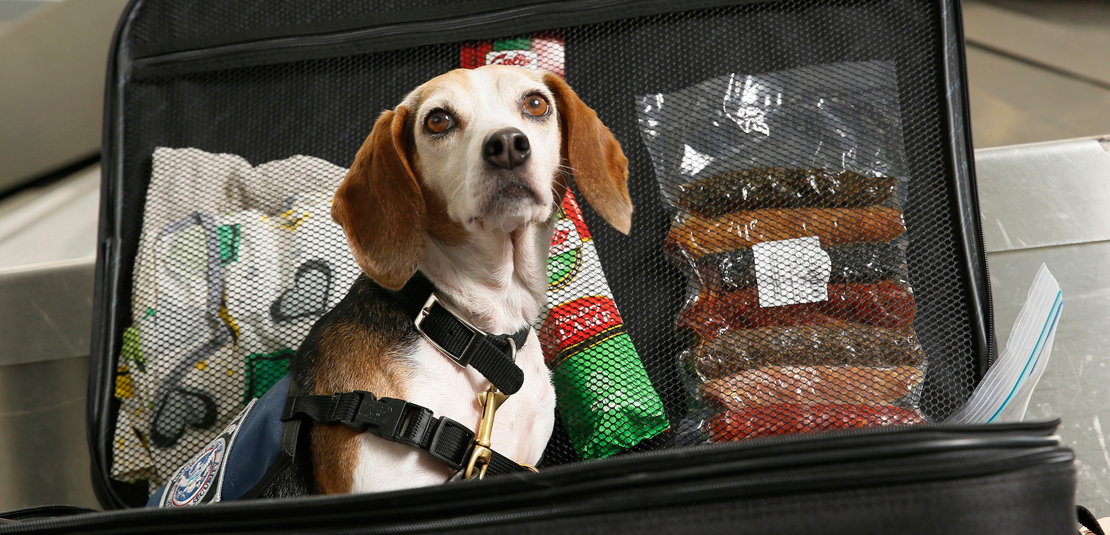Fourth Global Canine Forum spurs lively discussions
19 March 2018
The core business of Customs administrations may well lie in making trade secure, but the time spent conducting inspections on goods consignments continues to decrease. The use of technology, in particular non-intrusive inspection (NII) equipment such as scanners and endoscopes, has contributed considerably to expediting Customs clearance procedures while guaranteeing a satisfactory level of security. However, the use of technology is severely restricted by cost both in developed countries subject to budgetary constraints and in developing countries limited by their ability to invest in control infrastructure, thereby allowing significant scope for “human” inspection methods and, in particular, canine units.
In fact, detector dogs have become the partners of choice of Customs services responsible for tackling fraud, and are a particularly reliable and increasingly multi-skilled, non-intrusive detection “tool.” Initially confined to combating drug trafficking, the role of canine units has developed and adjusted to the constantly evolving practices of organized crime. Faced with the situation where organized crime has infiltrated legal trade, Customs and other law enforcement agencies have made great strides in extending canine detection capabilities to such areas as security, combating the trafficking of currency and endangered species, and even safeguarding intellectual property rights. Nowadays, Customs makes extensive use of detector dogs as part of its risk management programmes.
In 2011, as part of its mission to support its Members in enforcement matters, the WCO organized the first Global Canine Forum specifically focused on dogs and dog handler teams. Given the success of this first Forum, the WCO made the event a permanent fixture to be convened every two years, with a view to creating the conditions needed for experts to share experiences and pool best practices. From 2 to 4 October 2017, some 120 delegates representing 44 Customs administrations and international organizations attended the fourth edition of this event in Prague, which was organized with the support of the Czech Customs administration and funded by Japan Customs.
The main objectives of this latest edition were to prompt those Customs administrations with training centres to share best practices and experiences, and to identify the common challenges confronting management teams, especially with regard to the training programmes to be scheduled and operational models to be implemented. Over the three days of the Forum, participants discussed these issues during presentations and talks, which gave rise to lively discussions among specialized professionals. They also had the opportunity to attend demonstrations by canine units. The sessions, each of which was led by experts with extensive experience in their respective area of expertise, centred around three main themes:
- Latest developments on the use of dogs in the search for drugs, firearms, explosives, alcohol, metals, currency, species protected under the Convention on International Trade in Endangered Species of Wild Fauna and Flora (CITES), and for goods covered by intellectual property rights. Discussions focused, in particular, on the training of canine units in new methods, the challenge of using canine adaptability to the best effect, and the implications of achieving cooperation between the different bodies entrusted with the prevention and punishment of offences.
- Best practices in terms of dog breeding and the management of a dog training centre, and, more specifically, best practices concerning dog selection, choosing the breed to match the discipline, logistics and infrastructure of a centre (kennels, vehicles, training tools used), its management, continuous monitoring and evaluation of its operation, and the participation of canine units in the worldwide mechanism set up to combat fraud.
- Challenges relating to the use of canine units and the ensuing implications for capacity building, in particular, problems specific to the use of dogs in frontline operations, training methods, the content of training programmes, the recruitment and training of dog handlers, and even the running of regional and national dog training centres.
The demonstrations by the canine units, which were organized by Czech Customs, allowed participants to witness the dogs’ skills in searching for a diverse range of goods: drugs, firearms, cigarettes, alcohol, CITES goods, and currency. Watching the dogs at work and the manner in which they rapidly sniff out different forms of contraband was truly remarkable.
The next Global Canine Forum will be held in 2019. In the meantime, the WCO will continue to provide all necessary assistance in the use of canine units to any of its Members requesting such assistance. Furthermore, it invites all Customs officers concerned with these issues to join the “Global K9 Forum” virtual group that has been operating since 2011 via an electronic platform. This global network of canine experts currently comprises over 200 active participants, representing 78 administrations. Experts can use the platform to access key information stored in the library reserved for their user group, and share their experiences and views using a secure messaging system.
More information
sylvain.raymond@wcoomd.org
steve.yuen@wcoomd.org
As of 2017, a total of 12 Regional Dog Training Centres (RDTCs) have been set up in different regions of the world in order to train detector dogs and their handlers as well as provide assistance on the use of canine units to any Customs administration making such a request. In addition, documentation is available for consultation by any WCO Member wishing to obtain information on the conditions that have to be met when seeking accreditation as an RDTC.
